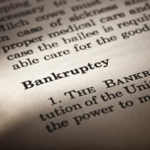As a Jacksonville Bankruptcy Lawyer I have had many clients come to me to file bankruptcy with many misconceptions about bankruptcy. Because of these misconceptions, clients often put off filing bankruptcy until they have absolutely no other option. Yet most of these misunderstandings are false. Here are the most common misconceptions my clients have had about filing bankruptcy. In fact, after reading this filing bankruptcy might not seem as scary of a process.
1. Credit:
The most common misconception I have heard about filing a Jacksonville Bankruptcy is that filing bankruptcy ruins your credit and you will never be able to get credit again. This notion is absolutely false. However, it is true that a bankruptcy filing can appear on your credit report for up to 10 years. However, this does not necessarily mean the bankruptcy will hurt your credit rating. In reality, filing bankruptcy most likely will only help improve your credit score. The reason that filing bankruptcy will help improve your credit score is because your credit score is most likely already ruined by the time you file bankruptcy. Therefore, filing bankruptcy will likely not do any more damage to your credit report. Instead, filing bankruptcy helps to improve your credit report by taking away your credit card balances, stopping all of the negative credit reporting and finally giving you the opportunity to start improving your credit report.
If you file a Chapter 13 Bankruptcy you can even obtain new credit during your Chapter 13 Plan. You will just have to obtain permission from the court first. If you file a Chapter 7 Bankruptcy, then you might find that you receive many new credit card offers in the mail in no time after receiving your Bankruptcy Discharge. This is because you no longer have any debt and are seen as a good candidate for credit by credit card companies. But, keep in mind these credit card offers aren’t going to have the best interest rates. However, over time, as long as you pay your credit card on time each month, you will improve your credit score and will be able to get a credit card with a good interest rate in the future. Continue reading →
 Jacksonville Bankruptcy Lawyer Blog
Jacksonville Bankruptcy Lawyer Blog





